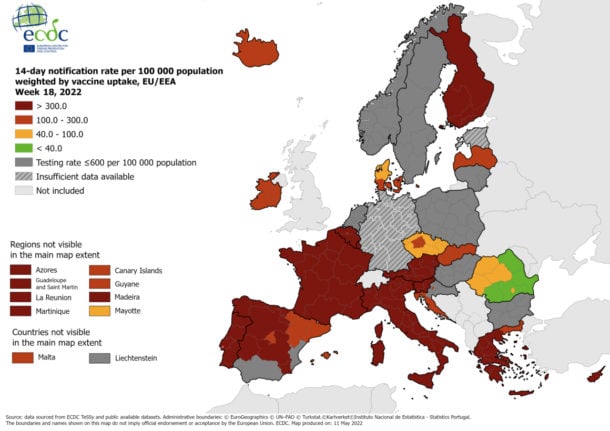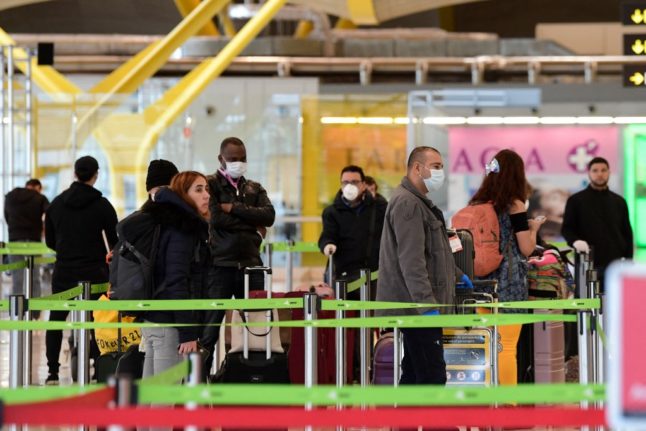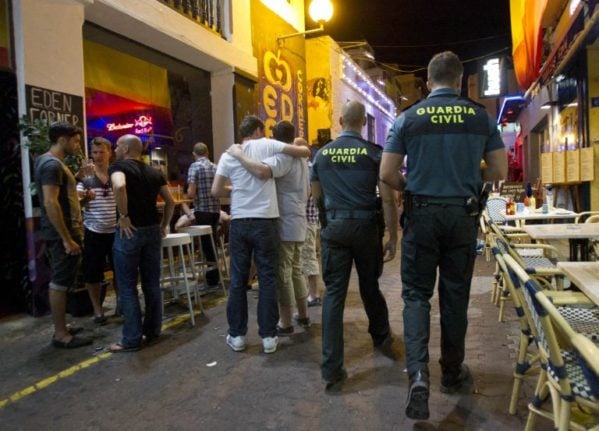Over the past couple of months, the Spanish government has gradually adapted legislation to its plans to treat Covid-19 like the flu.
They’ve stopped counting and reporting each and every Covid-19 case in the country, lifted quarantine for mild or asymptomatic cases and scrapped mask wearing rules for most indoor public spaces.
And yet when it comes to Covid-19 travel rules, many still remain in place.
Most travellers need to show proof of vaccination, testing or recovery either in the form of a Covid Digital Certificate or another certificate from an official body, and many still need to fill in a health control form.
READ ALSO: When do I need to fill out Spain’s Covid health control form for travel?
Unvaccinated EU tourists who haven’t had Covid in the past six months have to get a test before visiting Spain and those who did get vaccinated but did so more than 9 months ago, have to get a booster shot to be considered immunised again.
But on May 19th, there was an important development.
Spain’s Tourism Minister announced that “in a matter of days” unvaccinated third-country nationals such as Britons and Americans would be able to travel to Spain for a holiday with proof of a negative Covid-19 test.
The surprise announcement came just days after Spanish health authorities decided to extend the ban on non-essential travel for unvaccinated non-EU holidaymakers until June 15th.
It represents a key moment for travel restrictions in Spain as for practically the entirety of the pandemic unvaccinated non-EU tourists have been unable to travel to Spain, with only exceptional reasons for travel allowed.
Even though the EU has urged Member States to implement similar Covid travel legislation throughout the pandemic, they are free to ease or tighten restrictions as they see fit based on their epidemiological situation.
Other EU/Schengen countries have already lifted all their Covid-19 travel restrictions, including Austria, Bulgaria, Czech Republic, Denmark, Hungary, Iceland, Ireland, Latvia, Lithuania, Norway, Poland, Romania, Slovenia, Sweden and Switzerland.
Greece is the latest country added to this list, a direct competitor of Spain in the tourism stakes.
France, Portugal and Italy still have some of the requirements Spain has, but they decided to allow unvaccinated non-EU tourists in with a negative Covid test more than a month ago.
France has also just implemented EU advice and removed the requirement of wearing a mask on public transport, whereas Spain has decided to keep the rule for inside airplanes, trains, taxis and buses but not airports or stations.
When will Spain lift its other Covid-19 travel restrictions?
Aside from the Tourism Minister’s recent announcement that Spain will soon allow unvaccinated non-EU/Schengen tourists in – arguably the biggest travel restriction still in place in Spain – the Spanish government has given no indication of when it will, nor if it will remove some of the remaining travel rules.
It’s been hard to understand why Spain didn’t adapt its travel regulations to the more lenient approach of domestic rules earlier, as the country has been looking to put the pandemic behind it and recover the full force of its tourism industry for several months now.
Perhaps Spanish authorities didn’t consider that the added income unvaccinated tourists could bring was worth the potential health risk of allowing them in, but Tourism Minister Reyes Maroto did recognise that the upcoming lifting of the ban will help boost tourism numbers.
There’s also the 270-day validity of Covid vaccine passports, which means that those who haven’t had a booster shot have to either pay for a test or get the jab, and if not they cannot travel to Spain. Another potential factor dissuading visitors.
Maroto did say “we are going to stop requiring the vaccination certificate” but it is unlikely she was referring to scrapping the need to show a Covid-19 certificate altogether when arriving in Spain, as she was most likely just referring to stop requiring a vaccination certificate from non-EU tourists.
In early May, the European Parliament did back a one-year extension for the EU Digital COVID Certificate framework to be kept in place, but MEPs have stressed Covid travel rules should be limited and proportionate, and based on the latest scientific advice from the European Centre for Disease Prevention and Control (ECDC).

The ECDC’s latest epidemiological map of the EU shows far less infection data than previously, which showcases the changing attitudes of EU nations that have lifted all travel restrictions, although the map does show how Spain’s fortnightly Covid infection rate continues for the most part above 300 cases per 100,000 people, the highest risk category.
“The European Commission (EC) strongly supports the decisions of the Member States to lift these restrictions when possible”, EC sources are quoted as saying in Spanish daily 20 minutos.
With previous Covid rules, the Spanish government has often waited to see what neighbours Italy and France did first, or for an official announcement from the EU, before executing a decision.
This may be what Spain needs to ease the remaining Covid travel rules, masks on public transport and having a Covid health pass or health form to prove your vaccination, testing or recovery status.
Until then, Spanish health authorities may continue to play it safe.



 Please whitelist us to continue reading.
Please whitelist us to continue reading.
Member comments